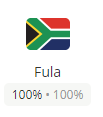Hi
In the change language setting, the language name is not in Fulah. Most Fulah users don’t know the word “Fula”. Should rather be the name used in Fulah, i.e Pulaar or Pulaar-Fulfulde.
Thanks
Ibrahima
Hi
In the change language setting, the language name is not in Fulah. Most Fulah users don’t know the word “Fula”. Should rather be the name used in Fulah, i.e Pulaar or Pulaar-Fulfulde.
Thanks
Ibrahima
I went with the name from translate.keyman.com

But we can change it to “Pulaar” (confirming not “Fulah”) in the next release (may be 2+ weeks because our team will be in a short break)
Hi @darcy ,
I thought it was translated as “ssLanguageName” in the Keyman strings? That name is coming from Corwdin I think, and with wrong flag (South African flag, nothing to do with Fulah!).
It happended with other programs but they said it’s default in Crowdin and they can’t change it.
Cheers
Ibrahima
Yes, let’s go with ssLanguageName from the Keyman strings. That’s what Keyman for Windows uses.
Wikipedia
I think we should rely on local knowledge from Ibrahima rather than Wikipedia!
I thought it was translated as “ssLanguageName” in the Keyman strings?
Ah, we’ve split strings across different files for each platform. Keyman for Windows uses ssLanguageName so it’s not available in Keyman for Android.
I’ve created some pull-requests in the code to change the name from “Fula” to “Pulaar”
Will update when the release is ready
Correct. Let’s just use that name as a default when we prepare the translations ![]()
Hi,
I thank all of you for your comments. It’s true some use Fula and other Fulah. But for consistency, Fulah has been used in all software localizations for naming the language in English. And Pulaar-Fulfulde in Fulah. Since the language has two names in Fulah, Pulaar in the West, Fulfulde in the East, in software localizations, we mostly adopt Pulaar-Fulfulde for simplicity, but more importantly, for unity!
These two names do not match dialects, both include different dialects, just to be clear.
As for Wikipedia, (and even sometimes SIL or Ethnologue), it is a huge source of error and misleading information. Just an example, there is widespread use of the term Tukuloor as a Fulah dialect, which raises our eyebrows because that term does not exist in Fulah. And we do not know what Tukuloor or Tukloor means!!
It is very easy to spread inaccurate information nowadays if we don’t rely on the very people that the information is all about.
One last thing, the dialect Pulaar (fuc), even though a minority in the Fulah communities across West and Central Africa, is the most advanced as far as codification, digitization and content production is concerned. It tends to become slightly more of a standard because 90% of books, web content and almost all localizations are in Pulaar (Firefox, Facebook, and many more apps…)
Sorry for being a little long.
Cheers
Ibrahima
Thanks @ibrahima for the detailed context! It’s always interesting to learn more about the languages we want to support.
We’ve just added a change to use “Pulaar-Fulfulde” for the language name in the Android app, and that should appear in the published version in the next few days.
Hi @Marc,
Great. I am looking forward to the next updates for all those exciting features on the roadmap.
Cheers
Ibrahima